- Home
- Taylor Caldwell
On Growing Up Tough Page 2
On Growing Up Tough Read online
Page 2
Miss Blank cleared her throat. “Children I want to give you a lesson today in Tolerance and Love.”
The faintest groan came from the sturdier boys; this was bound to be dull. They had never heard of Tolerance, but Miss Blank was an uninspired teacher and she would have nothing interesting to say about anything.
Miss Blank’s suffused eye slowly settled on Irma Jones. Irma wore a bright blue velvet dress with real lace at the neck and wrists. “Dear Irma,” sang Miss Blank. Then she engaged the rest. “You must not despise Irma because—she—is—a—Negress,” said Miss Blank. “She cannot help it. You must not look at her color. She is just as human as the rest of you.”
All heads swung to Irma, who suddenly cowered in her seat. So help me, until that evil moment, none of us had ever noticed that Irma was colored! She was just a kid like the rest of us, with nicer clothes and a more indulgent mother and somewhat better manners. Now we stared at Irma, hypnotized. She was different from us! She was apart from us. The children about Irma began to move away from her in their seats, with uncomfortable faces and averted eyes. I could feel that something intensely wicked had flowed from Miss Blank’s area, and without a formed reason, then, I began to hate her.
Miss Blank’s gulp was loud and righteous in the silent room. She then swung those abominable eyes upon Fanny and Anna, who looked back at her confusedly. “Nor,” sang Miss Blank, “must you hate Fanny and Anna because they are Jews. You must love them dearly, as your Fellow Men, in spite of what you are taught in your Sunday-schools.”
No one had ever taught us to despise Jews in our churches. We had heard, with the vagueness of childhood, that Our Lord had been born in some far-off and only half-believed-in country called Israel, among His fellow countrymen who were called Jews, and that some of His countrymen had loved Him to the death and others had hated Him. (It was part of the incomprehensible way of grown-ups, we had decided, and not to be taken too seriously.) But now, all at once, poor pretty Fanny and Anna had become those who had hated Our Lord. They were responsible for His crucifixion! What had once been only a part of Christianity now became the crucial, the damning, the hateful part. The Crucifixion was now not only God’s plan for the salvation of man and the sign of His eternal love for us, but an act of infamy of which little Fanny and Anna were the main criminals. From some bulky boy in the background came awful words, “Christ-killers!”
The shrinking from Irma was nothing compared now with the shrinking from Fanny and Anna. But I could only look at Miss Blank. I felt an adult desire to go to her desk and beat her into the floor. My young heart burned as no child’s heart should be made to burn. I am sure I was not alone.
The silence in the room was the silence that fills an execution chamber. Then, while almost all eyes glared at Irma and Fanny and Anna, Irma rose with the immense dignity of her people and, head held high, walked slowly and firmly to the door. She closed it behind her. While we still sat frozen in our horror of everything, Fanny and Anna rose also, their faces white and trembling with tears, and left also. Miss Blank waited until the door was shut then she fixed us with her accusing eyes.
“You see,” she thundered, “what you have done to Those Poor Children! You are very bad indeed.”
We said nothing. We thought the monster had done with it. But now it was my turn. Her eyes fixed themselves on me. “And there’s Janet Caldwell,” she said, and at once the new hating gaze of my fellows moved in my direction. “In spite of the American Revolution, you must not hate Janet because she was born in England!”
Now those were the days, just prior to the first World War, when the British were not loved in America, nor were they to be loved until 1917, with some remaining reservations. I had accepted that fact. But I had sung the national anthem as loud as anyone; I had as fervently pledged allegiance to the flag. I had not considered myself different from my native-born American schoolmates. It is true that at home my parents had had some derisive things to say about American customs, but I ignored them as all children ignore the words of adults—most of the time. My father had told me that one of my ancestors had fought with, not against, George Washington, before he had returned to Scotland to found his family. But that had not been important, either. The Arkansas Street Regulars were the most important thing in my life; we were trying to get a catcher’s mitt and a new baseball bat, without much success.
I sat transfixed by the newly despising eyes of my friends. Then the bulky boy in the rear said, “Redcoat!” I had had it.
I am usually a peaceful person, slow to wrath. But what I had witnessed concerning Irma Jones and Fanny and Anna, and what I was suffering now, filled me with the blackest rage. I stood up and hurled a book at Miss Blank. It caught her smartly on the cheek and she howled and fell sideways. Then I went to the door, followed by whistles and jeers and exclamations of dismay.
I stood in the hallway and the blackness in my heart rose to my eyes and I could hear my heart pounding. I hoped I had killed Miss Blank. Then I went down to see our principal whom I knew as a good man, and kind and sensible. I told him what had happened. He listened gravely. He said not a thing; he only shook his head. After a while he told me I could go home.
Of course, in the way of children, I did not tell my parents. Mama was a fiery little woman. She would go at once, I knew, to Miss Blank and tell her a thing or two before her students, and that would make matters worse. I had come a long way in knowledge. I developed a sick headache that night, my first, and so stayed at home until Monday. And when I returned Miss Blank was no longer there; we had a new teacher.
But Irma Jones never came back, either, and neither did Fanny and Anna. They had transferred to another school. However, I was stuck. I was the “foreigner,” and shunned. I was removed as president of the Arkansas Street Regulars. I never got over it. I never shall.
Many years later, my husband and I had a piece of property to sell. One hot summer day a white man arrived in a car with his colored chauffeur. Our housekeeper was a colored woman, a member of our family whose law was not to be challenged when it came to children and the affairs of the household. The white man, complaining of the heat, sat down with our housekeeper and drank lemonade with her. The chauffeur, a much younger man, wanted me to show him the grounds. It was evident that he considered his employer not one with good judgment, so it was up to him to decide. I took the chauffeur around the grounds, employing my salesmanship, and he remained courteously unimpressed, like all potential buyers.
Apparently the property did not come up to the standards of the chauffeur, for we never saw either of them again.
But I saw my neighbors. The next day a delegation of ladies, red-faced, and in a temper, arrived to see me. They refused refreshments, so I fixed myself some bourbon and ice and wondered about the infestation. I was soon enlightened. The leader of the ladies drew a deep breath and then burst out, “We understand that you are going to sell this property to niggers!”
I winced at the ugly word, “What?” I asked. “What are ‘niggers?’”
She flounced and glared at me. “You know very well what I mean! We saw you showing them around.”
Again, I wish to affirm I am a peaceable person. But suddenly I saw little Irma Jones’ face. I stood up. “Get out of here,” I said. “If you don’t go at once I’ll call the police.”
I did not see the leader of the ladies again until about two years ago. She appeared at our house with a petition for me to sign “against segregation in the South, and for strict adherence to the Supreme Court’s ‘law’.”
I asked the lady to sit down. I knew her reputation by now. She was a great Liberal. There was not a Cause that she was not dabbling in. She was against prayer in schools—“a separation of Church, and State, you know.” She was against all kinds of “bias.” She clamored for better housing conditions for the colored people in the city, and the wretchedly cold and newly arriving Puerto Ricans. She was all for free speech, if it concerned the free speech of her fellow Libera
ls. She belonged to this league, and she belonged to that.
“In the first place,” I said to her, flexing my muscles with anticipatory enjoyment, “you have forgotten a basic part of the Constitution. The U.S. Supreme Court does not pass ‘laws.’ It only interprets the Constitution. In the second place, my observation has shown me that since that Court voted that decision every one in the country has become color-conscious. This is cruel, and dangerous. The Court has divided the white man from his neighbor. Was that the real intention, anyway? Is that what you like about it?”
Her florid face became bright crimson. She shook a gloved finger at me. “It is evident,” she said in a menacing voice, “that you don’t like Negroes, that you are a reactionary.”
“I don’t know if I like Negroes or not,” I said. “I’ve never met any, not having been to Africa. If you are referring to colored people, then I know dozens, and I know their bitter anxiety these days, and their justified alarm. Moreover, it seems to me that you visited me not too long ago to accuse me of trying to sell some property to what you referred to as ‘niggers.’ I think the newspapers would like to know about that. Now, will you kindly get the hell out of my house?”
She jumped up very fast, and that was quite an accomplishment, considering her obesity. She could have murdered me on the spot, and I hoped she would try. My father taught me boxing and wrestling when I was a child and I wanted to take the lady on.
“There’s a difference,” she spluttered, “to being just to them and having them live next door to you!” Then she rushed out with a frightened, backward look.
Yes, I could have told her there is a “difference.” You despise your colored neighbor in your cold, hypocritical heart. But it is not the style, these days, to be frank, to be candid about aversions “on the basis of creed or color.” And you are all for style, for modishness, for “progress.” You want to force the colored man to live next door or in the next apartment to the white man whether he wants to or not, and most of the time he’d prefer not to. You fawn on the colored man at public gatherings, until he is embarrassed half to death. I have news for you! You are more than he can endure; you are making his life intolerable. He no longer thinks of himself as an American. He thinks of himself as a Negro, someone apart from his fellowman, something alien, something strange, something to be “tolerated.”
How dare you force that ignominy on a fellow creature, who is the same soul in the eyes of God as you are? (But I forgot; you don’t believe in God.)
How dare you call to the attention of a white man that his colored fellowman is to be “loved” and not to be treated merely as a co-worker or a friend, or even as an enemy if the two are incompatible? Before God, you have done the most evil of all things: You have set man against his brother, white man against black, black against white.
Is that your intention? I think it is. You have your reasons, and I know them. You want to destroy our free country. A house divided against itself cannot stand.
My father was a Republican. Mama was a Democrat. I doubt if either of them voted regularly, or at all, in the manner of most Americans, foreign-born or not. Election times were spirited. There were bonfires on the streets, and Papa and I would go out and enjoy them. He’d have a bonfire, too, no matter who won the elections. For, you see, free elections were the celebrations of a free people. They are no longer. Now they are vicious battlegrounds, and Republicans hate Democrats, and vice versa.
Up to 1933, when I was a very young woman, I never knew if my friend or neighbor or co-worker was a Republican or a Democrat, and I could not have cared less. Sometimes I voted for a Republican—I was a registered one. But most of the time I split my ticket. I voted for the great Al Smith, and nothing will shake my conviction to this day that had we elected Mr. Smith there would not have been a second World War. Hitler would have vanished from interest-malnutrition. Stalin might have remained and died almost unknown behind his grim mountains. There might even have been no advance of Communism in the world, no present terror. And, no wars. For Mr. Smith would have been reelected again in 1932.
You cheered for your candidate in those innocent days, and whether or not he was elected you built bonfires and celebrated. You did not know if your close associates were Democrats or Republicans. You never heard the word liberal. In fact, Republicans in those days were considered more “advanced” than the average Democrat, even in the North. They were also bigger spenders in public office, believe it or not. In fact, FDR expressed himself as horrified that we had a twenty billion dollar public debt in 1932and he had a right to be horrified.
I dimly remember that when I was a very young child Teddy Roosevelt was considered “progressive.” I better remember that you could buy a huge stick of gum then, in honor of Teddy’s Big Stick. But Teddy’s progressiveness appears downright medieval in comparison with what is going on these days among “modern” Republicans and “liberal” Democrats.
The Liberal did not really make his appearance until 1933 in any significant way in America. Though it may surprise some Republicans, Mr. Roosevelt said in 1933, “The liberal is a man both of whose feet are firmly planted in the air.” Mr. Roosevelt was too kind to him. We’ve all been too kind. It’s time we stopped being dangerously ignorant fools, whether we are Republicans or Democrats. For the Liberal is the enemy of us both.
From 1932 on, the Liberal seized control of the public means of communication, with rare exceptions. How he managed this so smoothly I don’t know. He must have been lying under the surface of our national life.
The Liberal is all for a free press—meaning free for his masters. But it is not free for all Americans. Many are the writers, once famous thirty years ago, who are not read today or even known, though I remember them. They refused to become part of the conspiracy against America, refused to shout for a second World War, refused to follow the Liberal/Communist line. So, they quietly disappeared from the awareness of readers. But those writers who obeyed the Liberal are still doing excellently today. They get Nobel prizes; the press constantly mentions them; the columnists relate little anecdotes about them. Clubs invite them to speak. Universities adore them and call them “serious” writers. (If you are an anti-Communist you are, per se, not a serious writer. I know. I’ve been through this.)
A writer, like an actor, needs publicity. If he is ignored, then he is not read, even by those who are in agreement with him. He gets no free advertising. When John Dos Passos was following the Liberal line the press adored him. He had book selections galore. His name was read everywhere. When he awoke from the nightmare the press suddenly became silent about him. This is what the Liberal means by “tolerance.” He will endure no opinion that differs from his own.
The American people, no matter their political party, are basically conservative and love their country. The Liberal knows this better than anyone else. So he fills his press and all the other public means of communication with Liberal lies and treacheries so that the average conservative American begins uneasily to wonder if there is something wrong with him, if he is out of step with his fellow-Americans. So, against all his convictions, he begins to mouth the Liberal Line. He must be in style. Man is a herd animal! He doesn’t want to be shunned or outcast. He doesn’t want to think he is “intolerant.” He does not realize it is his enemy who is intolerant and vicious and is deftly manipulating him.
Newspapermen, even those who work for ostensibly “conservative” newspapers have told me confidentially that they can never get a byline unless they write something liberal. The Liberal is everywhere, they tell me. His intolerant blue pencil is forever busy, he slants news. Look at our magazines. Let any reader tell me of a single magazine which numbers its circulation in the millions that is truly conservative. Occasionally, to show how “tolerant” he is, the inner Liberal will permit a conservative article in his magazine. But the editorial in the same issue will be overwhelmingly liberal. Show me the conservative writer—no matter how well known—and there are still a few o
f us—who are given bids by large magazines for articles. Very, very few.
I know many movie-makers who are basically conservative and good men. But they have to go to the banks for their money. And, invariably, there is a powerful Liberal in the bank who wants to see the script. Let that script be anti-Communist or truly patriotic or honestly revealing about the heart of America, and the movie-maker will not get money to produce his picture. Movie-makers have told me so.
Let an innocent schoolteacher—who believes that the Liberal is “tolerant”—try to inspire patriotism and all the great virtues of our Republic in her students, and she will soon hear from Liberals on the schoolboard. The girls have told me all about it, weeping. The Liberal, who is so very “tolerant,” insists that she speak of One World, that she subtly ridicule patriotism, that she spread the canard that the American Revolution was “really against the working man.” She must imply that our Constitution is an out-grown instrument; she must twist and deform it to please her liberal masters on the schoolboard. If she will not, then she is constantly transferred until she is exhausted, or resigns, or, if she is still on probation her contract is not renewed. She is a “disrupting” force in the schoolroom. She is not “tolerant.”
You cannot argue with a Liberal. Meet him in someone’s living-room and he will soon probe to discover “what you are.” If you are not of his brand, then he is after you. He can be insulting, will not endure your opinions. He shouts that you are “intolerant.” At the worst, he will insinuate that because you do not have his own mind you are an anti-Semite or you are anti-Negro. If he is politically powerful, he will try to destroy you. I speak from experience.

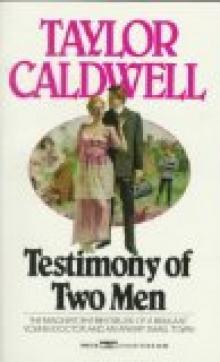 Testimony of Two Men
Testimony of Two Men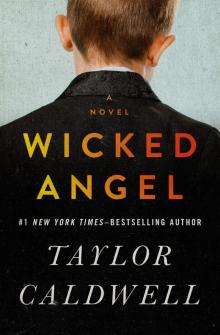 Wicked Angel
Wicked Angel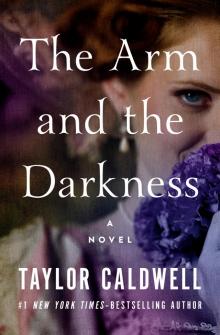 The Arm and the Darkness
The Arm and the Darkness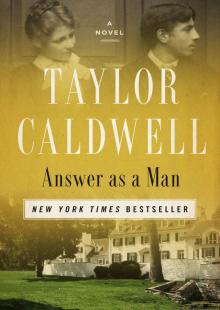 Answer as a Man
Answer as a Man Grandmother and the Priests
Grandmother and the Priests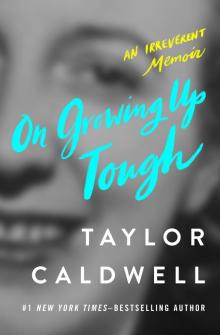 On Growing Up Tough: An Irreverent Memoir
On Growing Up Tough: An Irreverent Memoir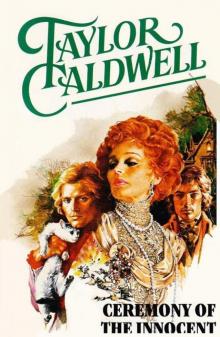 Ceremony of the Innocent
Ceremony of the Innocent The Listener
The Listener Bright Flows the River
Bright Flows the River The Earth Is the Lord's
The Earth Is the Lord's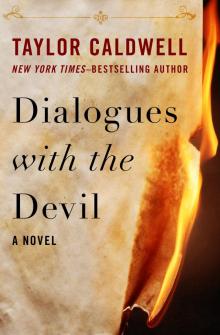 Dialogues With the Devil
Dialogues With the Devil A Tender Victory
A Tender Victory This Side of Innocence
This Side of Innocence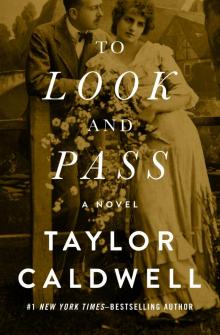 To Look and Pass
To Look and Pass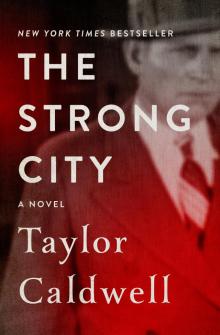 The Strong City
The Strong City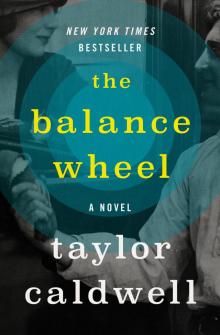 Balance Wheel
Balance Wheel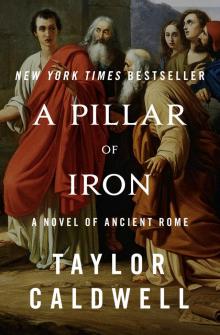 A Pillar of Iron: A Novel of Ancient Rome
A Pillar of Iron: A Novel of Ancient Rome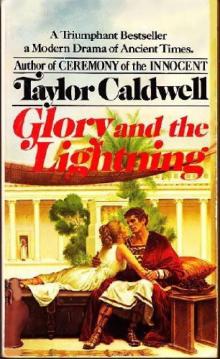 Glory and the Lightning
Glory and the Lightning Dear and Glorious Physician
Dear and Glorious Physician The Wide House
The Wide House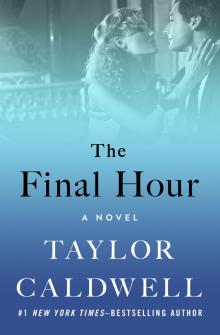 The Final Hour
The Final Hour Never Victorious, Never Defeated
Never Victorious, Never Defeated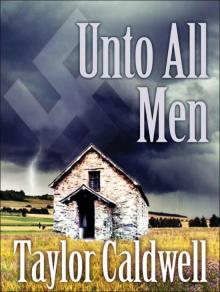 Unto All Men
Unto All Men The Turnbulls
The Turnbulls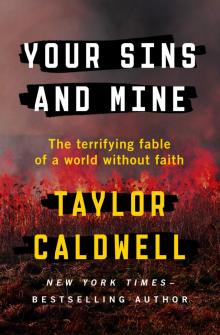 Your Sins and Mine: The Terrifying Fable of a World Without Faith
Your Sins and Mine: The Terrifying Fable of a World Without Faith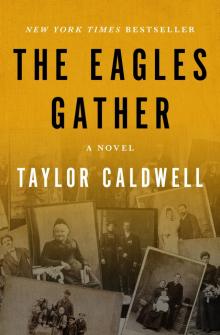 The Eagles Gather
The Eagles Gather Let Love Come Last
Let Love Come Last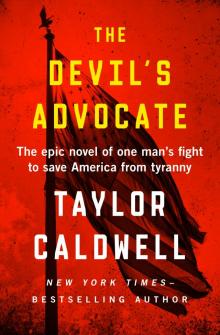 The Devil's Advocate: The Epic Novel of One Man's Fight to Save America From Tyranny
The Devil's Advocate: The Epic Novel of One Man's Fight to Save America From Tyranny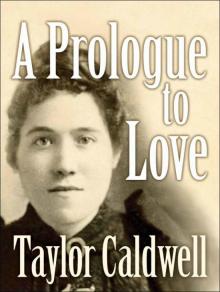 A Prologue to Love
A Prologue to Love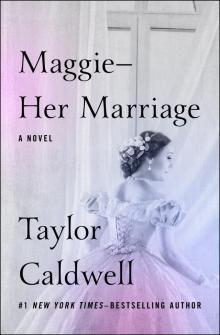 Maggie: Her Marriage
Maggie: Her Marriage The Late Clara Beame
The Late Clara Beame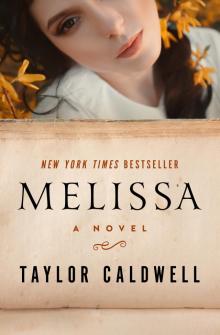 Melissa
Melissa Great Lion of God
Great Lion of God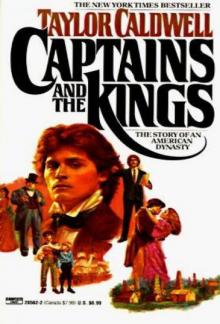 Captains and the Kings
Captains and the Kings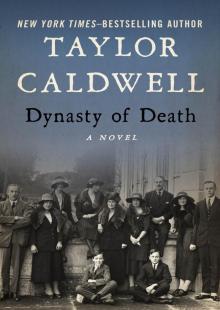 Dynasty of Death
Dynasty of Death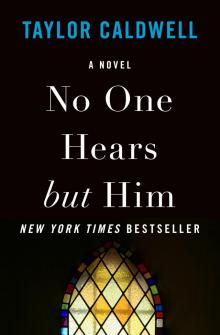 No One Hears but Him
No One Hears but Him The Sound of Thunder
The Sound of Thunder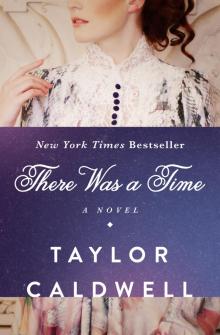 There Was a Time
There Was a Time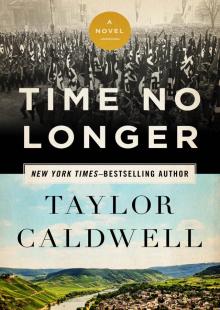 Time No Longer
Time No Longer I, Judas
I, Judas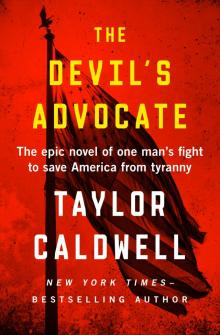 The Devil's Advocate
The Devil's Advocate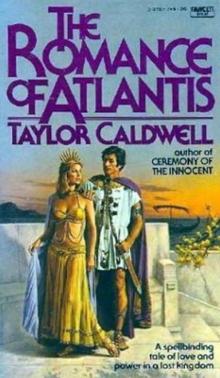 The Romance of Atlantis
The Romance of Atlantis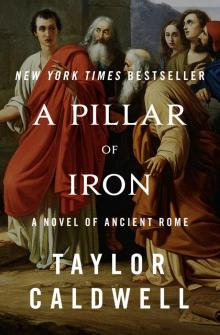 A Pillar of Iron
A Pillar of Iron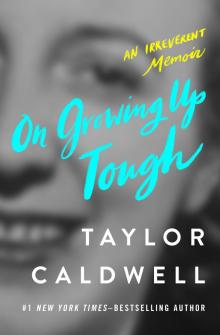 On Growing Up Tough
On Growing Up Tough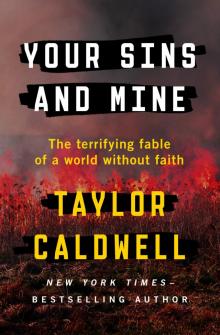 Your Sins and Mine
Your Sins and Mine